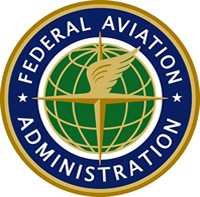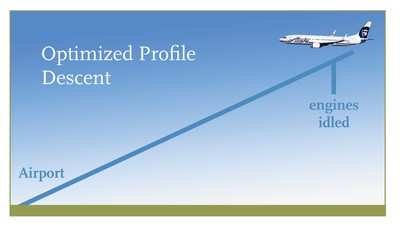Wed, Jul 15, 2009
Optimum Profile Descents Allow For Lower Power Levels
 A generation’s worth of gains in aerodynamics and
aircraft engine technology has dramatically reduced the number of
people exposed to high noise levels near U.S. airports, but future
noise reductions will depend largely on advances being developed
through the Next Generation Air Transportation System
(NextGen).
A generation’s worth of gains in aerodynamics and
aircraft engine technology has dramatically reduced the number of
people exposed to high noise levels near U.S. airports, but future
noise reductions will depend largely on advances being developed
through the Next Generation Air Transportation System
(NextGen).
In the late 1970s, noise from aircraft affected about 7 million
people. That number has dropped to fewer than 500,000, according to
the FAA’s Office of Environment, Noise Division, which tracks
the agency’s progress on noise-reduction targets.
The assessment is based on computing the areas surrounding U.S.
airports that are exposed, over 24 hours, to an average noise level
of 65 decibels or more — at or above the level of normal
conversation. The computation takes into account the number of
takeoffs and landings, the noise level of each, and whether the
activity took place during the daytime or at night.
Since the late 1960s and the advent of aircraft engines with
higher bypass ratios — which increase the percentage of air
that goes through an engine but not through its combustor —
aircraft noise levels have dropped 20 decibels. That translates
into making only one-fourth as much noise as they did 50 years
ago.
Although the impact of noise is at a minimum, the FAA predicts
that it will start to increase again soon and continue climbing.
Why? Aviation forecasts see continuing growth in traffic in the
years ahead. More traffic means more noise. Unless flight
operations can be made even more quiet than they are now, noise
exposure will increase.

The Noise Division continues to investigate ways to keep
aviation quiet, notably through the CLEEN (Continuous Lower Energy
Emissions and Noise) program, which provides incentives for
manufacturers to develop lower-noise aircraft. NextGen initiatives
being fielded now offer additional gains. New Optimum Profile
Descents (OPDs) enable pilots to reduce power, nearly to a glide,
as they land their aircraft. This eliminates the noise from
throttling the engines during step-down approaches near the
airport. Additionally, Required Navigation Performance allows
pilots flying OPDs to maneuver in areas around the airports to
avoid congested housing areas on the ground.
More News
Aero Linx: JAARS Nearly 1.5 billion people, using more than 5,500 languages, do not have a full Bible in their first language. Many of these people live in the most remote parts of>[...]
'Airplane Bounced Twice On The Grass Runway, Resulting In The Nose Wheel Separating From The Airplane...' Analysis: The pilot reported, “upon touchdown, the plane jumped back>[...]
"Burt is best known to the public for his historic designs of SpaceShipOne, Voyager, and GlobalFlyer, but for EAA members and aviation aficionados, his unique concepts began more t>[...]
"Polaris Dawn, the first of the program’s three human spaceflight missions, is targeted to launch to orbit no earlier than summer 2024. During the five-day mission, the crew >[...]
There Are SO Many Ways To Get YOUR Aero-News! It’s been a while since we have reminded everyone about all the ways we offer your daily dose of aviation news on-the-go...so he>[...]
 ANN's Daily Aero-Linx (05.04.24)
ANN's Daily Aero-Linx (05.04.24) NTSB Final Report: Quest Aircraft Co Inc Kodiak 100
NTSB Final Report: Quest Aircraft Co Inc Kodiak 100 Aero-News: Quote of the Day (05.04.24)
Aero-News: Quote of the Day (05.04.24) Aero-News: Quote of the Day (05.05.24)
Aero-News: Quote of the Day (05.05.24) Read/Watch/Listen... ANN Does It All
Read/Watch/Listen... ANN Does It All




